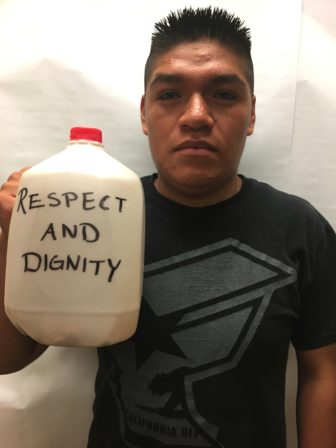
Adi Talwar
New York State dairy products. Farm industry interests say collective bargaining is incompatible with the unforgiving schedule of agribusiness. Many workers disagree.
Crispin Hernandez, 22, used to milk cows at Marks Farm in Lowville, New York. Over three years, he said he saw and endured many injustices, including working from 6 a.m. to 6 p.m. with very few breaks, not being treated for an injury after he was stepped on by a cow and being charged money for the right kind of gloves needed to do the job safely.
“We were yelled at constantly and I felt that the cows were treated better than we were as workers,” Hernandez said through Spanish to English translator Andrea Barrientos, a paralegal with the New York Civil Liberties Union (NYCLU), which is representing him in a lawsuit. Marks Farm declined to comment for this story
Hernandez is one of three plaintiffs suing over the fact that he was fired after, he said, he helped organize meetings with other workers. He and the other plaintiffs claim that the state law excluding farm workers from the right to organize is unconstitutional.
Last week, Judge Richard J. McNally decided that oral arguments would be heard in the case on July 20.
A victory in the case, brought together with the Workers’ Center of Central New York, a grassroots organization focused on workplace and economic justice, and the Worker Justice Center of New York, a human rights organization focused on agricultural and other low-wage workers, would give collective bargaining rights to farm workers throughout the state, something that has eluded advocates through the legislative process.
Legislation that has stalled in the state legislature, a version of which has been introduced without success for years, is broader than the lawsuit in that it would give farm worker’s rights beyond collective bargaining. It would also give farmworkers an 8-hour workday, the right to overtime pay, one day of rest per week, unemployment and compensation benefits, and rights related to injuries and sanitary standards for housing.
A glimmer of hope for the legislation came several years ago when Democrats controlled the State Senate and it was brought to the floor for the vote, but it lost narrowly. (It has not been brought to the floor for a vote again).
The New York Farm Bureau, a trade association representing the agriculture industry, has “lobbied aggressively against it,” says Erin Beth Harrist, senior staff attorney for the NYCLU. She added that “they’ve certainly opposed it every year it’s been up.”
Jose Chapa, legislative campaign coordinator for Justice for Farmworkers Campaign, a coalition of organizations working to pass the bill, says some version of it has been in the state legislature for at least 15 years. Upstate legislators have traditionally sided with the New York Farm Bureau and, Chapas says, it’s a challenge getting city-dwellers involved in the issue, even though they are key to making any legislative changes.
He lamented that a lot of people are “not really aware” of labor-law exclusions for those that toil in the fields even though “it’s become more trendy to go and get your groceries from farm workers.”
The New York Farm Bureau, in a statement on its website, contends that the bill’s passage would “only diminish opportunities for employees as well reduce the number of farms producing food in this state” — farms already “under extreme fiscal stress.”
According to statistics provided by the New York State Department of Labor, 22,525 laborers were engaged in the direct production of agricultural commodities (livestock or crops) in 2015, while the lawsuit claims a total of approximately 60,000 workers were employed in New York’s agriculture industry when the suit was filed and that the industry yielded $6.36 billion in sales in 2014.

Justice for Farmworkers Campaign
Crispin Hernandez
The suit also contends that the industry has “seen record growth” in New York, with cash receipts from agricultural exports more than tripling from about $500 million to more than 1.6 billion between 2000 and 2014.
In addition to lobbying against the bill, last June the Farm New York Bureau also intervened in the lawsuit, filed last May against Gov. Andrew Cuomo and the state. Intervening effectively made The new York Farm Bureau the defendant after Cuomo’s office put out a statement calling the farmworker exclusion “unacceptable” and an apparent violation of the state constitution. The attorney general also sided with the plaintiffs.
The New York Farm Bureau filed a motion to the dismiss the suit in November 2016, claiming the plaintiffs, “having failed over the course of two decades to convince the New York Legislature that the potential benefits of extending collective bargaining rights to farm workers outweigh the potential harm… are now attempting an end-run around the legislative process by bringing this issue to the courthouse.”
At the heart of the case is what happened to Hernandez, who claims that he and another worker were fired after a meeting at the other worker’s trailer on farm property in August 2015. They met to talk about conditions at the farm with some co-workers.
At that time Hernandez was already involved with the Workers’ Center of Central New York, and claims his assignment had already been changed as punishment. But he told City Limits he helped organize the meeting because of his interested in getting “adequate gloves”
“At that time the only thing we wanted was the right sized gloves for free,” Hernandez says. The farm sold the gloves $10 per box of 50, and what they were given free of charge did not protect the worker’s fingers and nails, which would yellow. According the lawsuit, the longer gloves protected workers’ hands from chemicals they were exposed to.
As part of the meeting with several co-workers he invited someone from the Workers’ Center of Central New York, who offered a safety training. At some point, the owner’s son came and interrupted the meeting. Within an hour of his visit, what appeared to be a state trooper and a local county police officer showed up. Nobody was arrested but, he says, people were shaken.
“It worked. They did intimidate us,” he says.
After a second meeting, Hernandez says he was told he no longer had a job at Marks Farm.
“At the moment when I was fired, I was very worried. I thought the police were going to be called. I was also very worried about how I was going to pay for food,” he says.
He lived on property owned by the farm and was given four days to get out, according the the lawsuit.
“Everything that happened to me was very real,” he says.
Hernandez and other plaintiffs in the case argue that the state law that prevented him from fighting his termination is based on the National Labor Relations Act, which excluded farmworkers as a way to appease Southern Democrats “who relied upon and actively sought to maintain the social and economic subordination of black workers, many of whom were agricultural workers,” according to legal documents. Because of that, the plaintiffs argue, it deserves heightened legal scrutiny because it was meant to keep jobs disproportionately held by blacks out of the New Deal’s progressive labor reforms.
The law also singles out a “politically powerless and marginalized group for differential treatment,” court documents say. Farmworkers “often lack lawful immigration status and cannot vote, speak little or no English live in isolation on their employer’s land, and are predominantly racial and ethnic minorities from out of state,” the plaintiffs argue, and the inability to organize just adds another layer of disenfranchisement.
“What we’ve done is create policies that are really saving an industry that’s dying on the backs of workers,” says Carly Fox, senior worker rights advocate for the Workplace Justice Program at the Worker Justice Center of New York.
In statements City Limits was directed to on the New York Farm Bureau’s website, the organization says that “the NYCLU’s assertions regarding farmers and their treatment of their employees are erroneous, insulting and disparaging…” The organization also claims that it is frustrated with the governor’s position and that “the right to organize is a labor union tactic that may work in a factory setting, but not on a farm where the planting and harvesting of crops and the milking of cows are extremely time sensitive and weather-dependent. For a farm to lose employees to an untimely walk-off of the job could jeopardize a season’s crop and place livestock health at risk.” That, the New York Farm Bureau argues, is what’s behind the exemption, not racism.
Hernandez, who now gives safety training to other farm workers as a member of the Worker’s Center of Central New York, seems more concerned with the impact of the law than its history. He says that “everything that happened to me is because farm workers don’t have the protection to organize, and that’s what we’re seeking with this lawsuit.”
“We as farm workers not only contribute to the state of New York, but we also contribute to the entire country by being a vital source of food,” he says.
CityPlate, City Limits’ series on food policy, is supported by the Laurie M. Tisch Illumination Fund. City Limits is solely responsible for the content.









2 thoughts on “Lawsuit Seeks to Win Organizing Rights for New York’s Farmworkers”
Farm work is different than standard union manufacturing jobs in cities. When crops need to be planted or harvested, you can’t take a few days off, it has to be done when mother nature allows the work to be completed.
Immigrants and people who come to our country to work on farms know the deal and conditions, they are not hidden. It is hard work but it is honest work and farmers treat their employees fairly. If what is said above is true, it is the exception, not the rule. Many jobs require you to purchase your work clothes and uniforms, this is not unusual. Buying gloves is no big deal.
This whole topic is another union created scenario to get votes and make business owners look bad. Creating a farm worker’s right law will only further erode and hinder our country farms and industries. If you want to kill farming in NY State, enact this type of law. But it is not needed. Continue with the law as it exists in NY State
What is not being acknowledged is that at the end of the day, the wages earned by the farm workers are diminished to such an extent that they end up owing the farm owner money. Because they work “24-7” they buy food and other consumables from the owners at highly inflated prices, pay for their living space – bunk beds that often provide fewer than six inches between their head and the ceiling; no heat in winter and stifling heat in the summer and a frequently contaminated water supply. This is exploitation and is more than a labor issue , it is a violation of human civil rights.